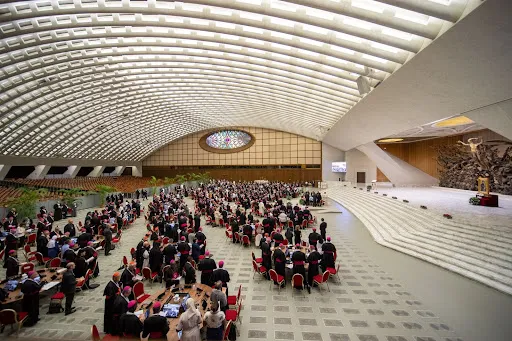
CNA Newsroom, Mar 18, 2024 / 11:30 am (CNA).
A Norwegian bishop and monk has hailed the publication of Norway’s first official Bible for Catholics as a breakthrough.
“The publication of a Bible presented and packaged as ‘The Catholic Canon’ by the Norwegian Bible Society is a major ecumenical event,” Bishop Erik Varden of Trondheim told CNA in an email.
“It invites us afresh to engage with the entirety of Scripture, to read each book as part of a whole, attentive to the symphony of voices that join in proclaiming a single, undying and saving Word. It is my hope that many Catholics will discover the immense fascination of the scriptural text, learning to love and revere it, letting their lives be renewed by it.”
Varden, 49, is a Trappist monk and spiritual writer. He was consecrated bishop of Trondheim, in central Norway, in 2020.
Published March 15, this Norwegian edition is notable not only for its inclusivity toward the Scandinavian nation’s Catholic minority, Catholic editor Heidi Haugros Øyma told CNA. The project saw linguists and Scripture experts collaborating with poets and other literary authors, including Nobel laureate Jon Fosse.
The Bible is now available in both official written languages of the country, Bokmål and Nynorsk.
Pål Johannes Nes, co-founder of EWTN Norway, told CNA: “This is also a very important element in the re-evangelization of Norway toward 2030 through Mission 2030, which EWTN Norway together with the Diocese of Trondheim are working on.”
“It is also a great joy for me to be able to read the Bible to my children in Norwegian,” he added.
What makes this Norwegian Bible Catholic?
The distinction between Catholic and Protestant versions of the Bible in Norway hinges on the inclusion of several additional texts in the Catholic Old Testament. Specifically, the Catholic canon incorporates seven extra books: Tobit, Judith, the First and Second Books of Maccabees, the Wisdom of Solomon, Sirach (also referred to as Ecclesiasticus), and Baruch.
Furthermore, it contains extended passages in the books of Esther and Daniel. These additional books and passages, known collectively as the Deuterocanonical books, are recognized and revered within the Catholic tradition but are not included in the Protestant version of the Old Testament.
Øyma, who was deeply involved in the project, told CNA: “The inclusion of the Deuterocanonical books represents a move toward a more inclusive, ecumenical approach to Scripture in Norway.”
“It is a way of saying that we belong here, we are a part of the cultural and Christian landscape.”
If you value the news and views Catholic World Report provides, please consider donating to support our efforts. Your contribution will help us continue to make CWR available to all readers worldwide for free, without a subscription. Thank you for your generosity!
Click here for more information on donating to CWR. Click here to sign up for our newsletter.









FYI only Douay-Rheims is the authorized English version of Holy Scripture.
Catholics don’t need to read Holy Scripture. To believe and promote the contradictory is Protestant.
Probably not a bad idea for Catholics to read the their Scripture, since it is part of the Tradition (under the guardianship of the Magisterium)—the Bible having been compiled, and the New Testament even written by members of the Church…
Prior to the 16th-century Douay-Rheims English version, official pronouncements on the canonical list of books came already in the 4th Century at the Council of Rome (A.D. 382) and North Africa, at Hippo (A.D. 382), and Carthage (A.D. 397). The seven controverted books of the Old Testament derive from the Latin translation of the Greek Septuagint (under Ptolemy in 2nd Century B.C.). Luther, in the 16th-Century, simply worked directly from (later?) Hebrew sources which did not include these books.
The Douay Rheims translation (English, OT in A.D. 1582, NT in A.D. 1609-10)), prepared in France and Flanders for refugees from Queen Elizabeth’s England, is based on Jerome’s Vulgate completed in about A.D. 405 (from the Greek and the Hebrew), and which was declared “authentic” at the Council of Trent. Not necessarily superior to the Hebrew and Greek, but reliable in matters of faith and morals (Dougherty, “Searching the Scriptures,” Image 1963). Augustine had regarded the Septuagint as inspired while Jerome had not.
In any event, it seems to this neophyte, that the Hebrew later used by Luther was more tribal, was confined to only Palestine, and was confined to a narrower window of time. The exclusion of the seven OT books, by Luther, need not erupt into fighting words. Simply a matter of different available sources, with the Catholic Church being more ecumenically “catholic” in what it recognized and accepted, over a thousand years before Luther’s birth.
“Catholics don’t need to read Holy Scripture. To believe and promote the contradictory is Protestant.”
A strange comment. The Bible is a Catholic Book. It was penned under divine inspiration. “Sacred tradition and Sacred Scripture form one sacred deposit of the word of God, committed to the Church” (Dei Verbum). And:
I became Catholic, in large part, because of the Bible. So perhaps I’m biased…
Huh?